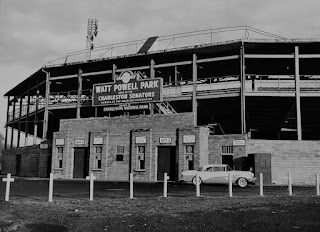Random Record Revisit:
Majesty Shredding – Superchunk [2010]
Didja ever have a
favorite band that you just loved and loved and loved and then one day they put
out a new album and you’re just “over them?” Superchunk became that band for me.
I was turned on to
the Chunk by Mr. Dunnigan in 1994. We spun side 1 of Foolish a lot at Chaz
Dunnigan and hen I spun it a lot more at home. The next four records became
staples in my little red truck [1990 – 2000] and little black truck [2000 –
2010]. I put on a lot of miles back in those years so there was a lot of
Chunking going on. Despite the fact that the band went on deep hiatus from 2002
to 2010. That was fine – 2001’s Here’s to Shutting Up was as perfect a
record as the band ever made. So it was a surprise when the Leaves In the
Gutter EP appeared in 2008, a single in 2009 and finally an album in 2010.
My initial
excitement at the idea of Majesty Shredding turned to indisposition. While
the kick off song Digging For Something fed my Chunk jones with a feel
of Shutting Up, the second cut My Gap Feels Weird was just not
for me. Musically it harkens back to the early 90s but I just don’t dig a lyric
of “my gap feels weird.” Rosemarie is pretty stock mid-tempo Superchunk.
Crossed Wires [the first single] is pure Superchunk power pop, which is
to say pretty power pop until you get to the middle eight / bridge where they
tend to go somewhere that a “normal” [i.e. popular, radio ready] song would not
go. Slow Drip would fall under that same umbrella. Fractures In Plaster
is a good slower track – nice little lead guitar lick 00:06 – 00:17. The kind
of thing that keeps Superchunk off mainstream radio. I think it’s Jim Wilbur on
that one. [Mac and Jim are just listed as guitars, no “lead.”] Learned to
Surf was originally on the Leaves In the Gutter but this version [or
remake] is heavily compressed and lacks the jangly charm of the “single”
version. Winter Games is more mid-tempo Chunky goodness. Rope Light
is more back to the roots Chunk. Hot Tubes feels like an out take from the
late albums Hello Hawk [1999] or Here’s To Shutting Up – not that
that’s bad!
If you ever ask
yourself [or ask me] “why revisit records haven’t heard in a while and
obviously aren’t missing?” Everything At Once is your answer. I had
completely forgotten this song. It starts off with some ambient noise, then
breaks into some Chunkian chording under some simple “whoo hoo hoo hoos”s for a
couple of choruses and the goes into a typical Mac McCaughan vocals – usually buried
in the noise so that you feel them and get sounds more than real words – but then
the chorus comes up: So here’s a song about nothing / And everything at once /
All the minutes and the months / Nothing and everything at once.” Then there’s
a little instrumental break, then some more whoo hoos, an extended chorus, a
little middle eight action, another swing through the whoo hoos on through the
four minute mark and then a fairly fast fade out. I mean there’s nothing more I
can say. It’s power pop for the “alternative” crowd and it’s just a slice of
musical heaven.
The “bonus tack” February
Punk is another 2:46 of early Chunk roots. I forget if this was a download track
with the single or maybe from buying from Merge directly. The player just went
to the next album in the queue, 1991’s No Pocky For Kitty and February
Punk just fits right in there.
I can think of many
reasons why this didn’t become a hardcore favorite but number one is going to
be that it came out in 2010. By 2010, I had a CD player in the car and I do not
play these factory CDs in my vehicles – well not very often. By that time, I
was focused on making my car mix CDs [8 Track Years, Walkman Years and FM
Flashback] and rarely listened to whole albums anymore. Honestly, I still don’t
listen to whole albums anymore, in the car or otherwise. I don’t recall ever loading
Majesty Shredding into my work MP3 player either. It just kind of fell
off of my radar pretty quickly.
Secondly, I just
lost interest in the band. I think that happens to lots of bands after a decade
or so. With exceptions of source – R.E.M. seemed like a band that didn’t repeat
a lot of things so their records always seemed fresh. But most bands kind of
found their formula and kept doing what they did.
Majesty
Shredding is not a bad album but it just feels like I’ve heard it all
before. So if I’m in the mood for some Superchunk, I’m obviously going to go back
the ones I already know and love.

